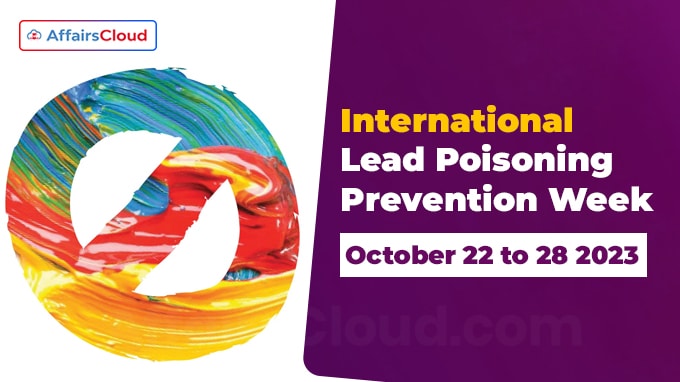
International Lead Poisoning Prevention Week (ILPPW) is annually observed across the globe on the last full week of October to raise awareness about the harmful effects of lead poisoning(lead exposure).
- The day also aims to promote the action to eliminate the use of lead in paint.
- This is an initiative of the Global Alliance to Eliminate Lead Paint (Lead Paint Alliance), jointly led by the United Nations Environment Programme (UNEP) and the World Health Organization (WHO).
In 2023, the ILPPW was observed from 22nd to 28th October 2023. This marks the 11th observance of ILPPW.
- ILPPW 2022 was observed from 23-29 October 2022 and the ILPPW 2024 will be observed from 20-26 October 2024.
2023 Campaign:
The 2023 campaign of ILPPW focuses on “End Childhood Lead Poisoning”.
- This highlights the unacceptable risks of lead exposure and the need for action to protect children’s health.
- The 2023 campaign builds on the success of banning the use of lead in petrol and the progress made by many countries in passing laws that limit the use of lead in paint, especially paints that children are exposed to in their homes, schools, and playgrounds.
Lead Paint Alliance:
i.The Global Alliance to Eliminate Lead Paint (Lead Paint Alliance) is a voluntary partnership formed by UNEP & WHO.
ii.It was established in 2011.
iii.Lead Paint Alliance aims to prevent exposure to lead through promoting the phase-out of paints containing lead.
Exposure to Lead:
i.Lead is a toxic metal that can damage the brain and nervous system, especially in children.
ii.Lead exposure can cause a range of health problems, including learning disabilities, behavioral problems, decreased Intelligent Quotient (IQ), and even death.
iii.United Nations Children’s Fund (UNICEF) estimates that 1 in 3 children – up to 800 million globally, have blood lead levels at or above 5 µg/dl(microgram/deciliter).
Elimination of lead and SDG:
Eliminating lead paint will help to achieve two Sustainable Development Goals (SDGs):
SDG 3.9: By 2030, substantially reduce the number of deaths and illnesses from hazardous chemicals and air, water, and soil pollution and contamination.
SDG 12.4: By 2020, achieve the environmentally sound management of chemicals and all wastes throughout their life cycle, in accordance with agreed international frameworks, and significantly reduce their release to air, water, and soil in order to minimize their adverse impacts on human health and the environment.
About World Health Organisation (WHO):
Director General – Tedros Adhanom Ghebreyesus
Headquarters – Geneva, Switzerland
Established in – 1948
About United Nations Environment Programme (UNEP):
Executive Director– Inger Andersen
Headquarters – Nairobi, Kenya
Established in – 1972




